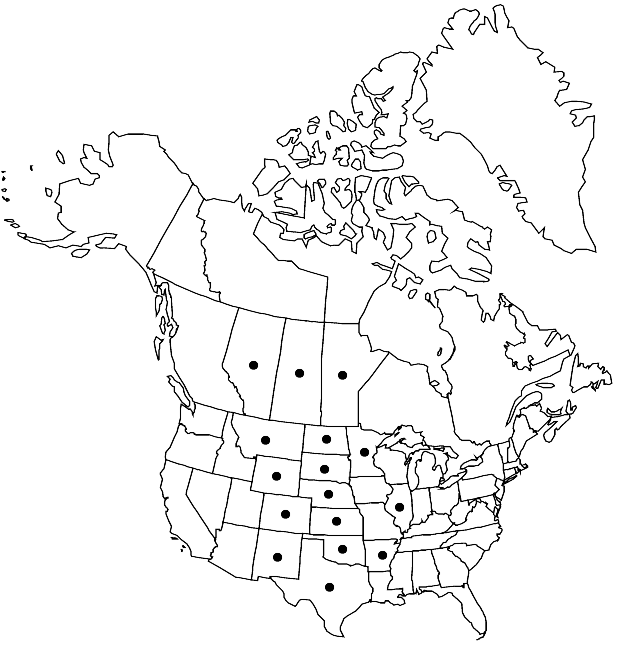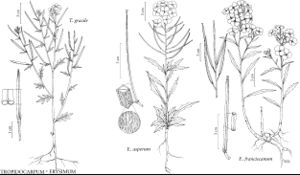Difference between revisions of "Erysimum asperum"
Syst. Nat. 2: 505. 1821.
FNA>Volume Importer |
FNA>Volume Importer |
||
| Line 10: | Line 10: | ||
|name=Cheiranthus asper | |name=Cheiranthus asper | ||
|authority=Nuttall | |authority=Nuttall | ||
| + | |rank=species | ||
|publication_title=Gen. N. Amer. Pl. | |publication_title=Gen. N. Amer. Pl. | ||
|publication_place=2: 69. 1818 | |publication_place=2: 69. 1818 | ||
| Line 16: | Line 17: | ||
|name=Cheirinia aspera | |name=Cheirinia aspera | ||
|authority=(Nuttall) Rydberg | |authority=(Nuttall) Rydberg | ||
| + | |rank=species | ||
}} {{Treatment/ID/Synonym | }} {{Treatment/ID/Synonym | ||
|name=Erysimum asperum var. dolichocarpum | |name=Erysimum asperum var. dolichocarpum | ||
|authority=O. E. Schulz | |authority=O. E. Schulz | ||
| + | |rank=variety | ||
}} | }} | ||
|hierarchy=Brassicaceae;Brassicaceae tribe Erysimeae;Erysimum;Erysimum asperum | |hierarchy=Brassicaceae;Brassicaceae tribe Erysimeae;Erysimum;Erysimum asperum | ||
| Line 42: | Line 45: | ||
-->{{#Taxon: | -->{{#Taxon: | ||
name=Erysimum asperum | name=Erysimum asperum | ||
| − | |||
|authority=(Nuttall) de Candolle | |authority=(Nuttall) de Candolle | ||
|rank=species | |rank=species | ||
| Line 57: | Line 59: | ||
|publication year=1821 | |publication year=1821 | ||
|special status= | |special status= | ||
| − | |source xml=https://jpend@bitbucket.org/aafc-mbb/fna-data-curation.git/src/ | + | |source xml=https://jpend@bitbucket.org/aafc-mbb/fna-data-curation.git/src/f50eec43f223ca0e34566be0b046453a0960e173/coarse_grained_fna_xml/V7/V7_848.xml |
|tribe=Brassicaceae tribe Erysimeae | |tribe=Brassicaceae tribe Erysimeae | ||
|genus=Erysimum | |genus=Erysimum | ||
Revision as of 22:19, 16 December 2019
Biennials. Trichomes of leaves 2- or 3-rayed. Stems erect, unbranched or branched distally, (0.6–)1.2–6.5(–8) dm. Basal leaves (often withered by fruiting); blade oblanceolate, 2–10 cm × (0.2–)0.5–1.5(–2.4) mm, base attenuate, margins dentate, apex acute. Cauline leaves (distal) sessile; blade margins entire or denticulate. Racemes considerably elongated in fruit. Fruiting pedicels horizontal to divaricate, slender, narrower than fruit, 5–16(–25) mm. Flowers: sepals oblong to linear-oblong, 8–12 mm, lateral pair slightly saccate basally; petals yellow, obovate to suborbicular, 13–22 × 4–9 mm, claw 8–15 mm, apex rounded; median filaments 8–14 mm; anthers linear, 2.5–4 mm. Fruits widely spreading or divaricate, narrowly linear, usually straight, rarely curved upward, not torulose, (3–)5–12(–14) cm × 1.2–2.7 mm, 4-angled, strongly (longitudinally) 4-striped; valves with prominent midvein and replum, densely pubescent outside, trichomes 2-rayed between midvein and replum, glabrous inside; ovules 72–120 per ovary; style cylindrical, slender, 1–4 mm, sparsely pubescent; stigma slightly 2-lobed, lobes as long as wide. Seeds ovoid, (1–)1.3–2.3 × 0.7–1.2 mm; usually not winged, rarely winged distally. 2n = 36.
Phenology: Flowering Apr–Jun(-Aug).
Habitat: Prairies, sand dunes, roadsides, bluffs, sandhills along stream banks, knolls, open plains
Elevation: 200-2000 m
Distribution

Alta., Man., Sask., Ark., Colo., Ill., Kans., Minn., Mont., Nebr., N.Mex., N.Dak., Okla., S.Dak., Tex., Wyo.
Discussion
Selected References
None.
